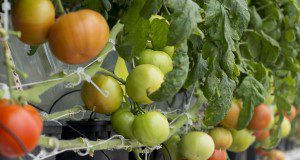Abstract
Recently, new plant-breeding technology such as CRISPR gene editing has provided the potential to substantially improve crop breeding in agriculture. Considerable efforts have been devoted to apply this gene-editing technology in modern agriculture to increase crop yields and improve the quality of food ingredients, especially by many of the major agronomic seed-producing companies. In this new 4-page article, we outline the recent research updates and regulations on gene editing in crop improvement. Written by Sadikshya Sharma, Heqiang Huo, and Seonghee Lee and published by the UF/IFAS Horticultural Sciences Department.
https://edis.ifas.ufl.edu/hs1334
References
Callaway, E. 2018. "CRISPR plants now subject to tough GM laws in European Union." Nature 560(7716): 16. https://doi.org/10.1038/d41586-018-05814-6
Dodds, N. M. W., L. M. Gorham, and J. N. Rumble. 2017. Floridians' Perceptions of GMOs: GMOs and Florida Citrus. AEC520. Gainesville: University of Florida Institute of Food and Agricultural Sciences. http://edis.ifas.ufl.edu/wc182.
Faure, J-D., and J. A. Napier. 2018. "Europe's first and last field trial of gene-edited plants?" eLife 7: e42379. https://doi.org/10.7554/eLife.42379
Funk, C., and B. Kennedy. 2016. "The new food fights: U.S. public divides over food science." 2016. Pew Research Center. https://www.pewresearch.org/science/2016/12/01/the-new-food-fights/
Jacobs, T. B., et al. 2015. "Targeted genome modifications in soybean with CRISPR/Cas9." BMC Biotechnology 15: 16. https://doi.org/10.1186/s12896-015-0131-2
Khachatryan, H., and H. J. Choi. 2017. Factors Affecting Consumer Preferences and Demand for Ornamental Plants. FE938. Gainesville: University of Florida Institute of Food and Agricultural Sciences. http://edis.ifas.ufl.edu/fe938.
Krishna, R., et al. 2019. "Transgenic tomatoes for abiotic stress tolerance: status and way ahead." 3 Biotech 9:143. https://doi.org/10.1007/s13205-019-1665-0
Ledford, H. 2017. "Engineered virus in line to battle citrus disease." Nature 545: 277. https://doi.org/10.1038/545277a
Lee, S., Y-H. Noh, S. Verma, and V. M. Whitaker. 2016. DNA, Technology, and Florida Strawberries. HS1287. Gainesville: University of Florida Institute of Food and Agricultural Sciences. http://edis.ifas.ufl.edu/hs1287.
Lee, S., C. Yoo, K. Folta, and V. M. Whitaker. 2018. CRISPR Gene Editing in Strawberry. HS1315. Gainesville: University of Florida Institute of Food and Agricultural Sciences. http://edis.ifas.ufl.edu/hs1315.
Normile, D. 2019. "Gene-edited foods are safe, Japanese panel concludes." https://www.sciencemag.org/news/2019/03/gene-edited-foods-are-safe-japanese-panel-concludes. https://doi.org/10.1126/science.aax3903
Rodríguez-Leal, D., et al. 2017. "Engineering Quantitative Trait Variation for Crop Improvement by Genome Editing." Cell 171(2): 470-480. https://doi.org/10.1016/j.cell.2017.08.030
Rothan, C., et al. 2019. "Trait discovery and editing in tomato." Plant J. 97(1): 73-90. https://doi.org/10.1111/tpj.14152
Sánchez-León, S., et al. 2017. "Low-gluten, nontransgenic wheat engineered with CRISPR/Cas9." Plant Biotechnol J. 16(4): 902-910. https://doi.org/10.1111/pbi.12837
Schneider, K., R. Goodrich Schneider, and S. Richardson. 2014. Genetically Modified Food. FSHN02-2. Gainesville: University of Florida Institute of Food and Agricultural Sciences. http://edis.ifas.ufl.edu/fs084.
Waltz, E. 2016. "Gene-edited CRISPR mushroom escapes US regulation." Nature News 532(7599): 293. https://doi.org/10.1038/nature.2016.19754
Unless otherwise specified, articles published in the EDIS journal after January 1, 2024 are licensed under a Creative Commons Attribution-NonCommercial-NoDerivs 4.0 International (CC BY-NC-ND 4.0) license.

